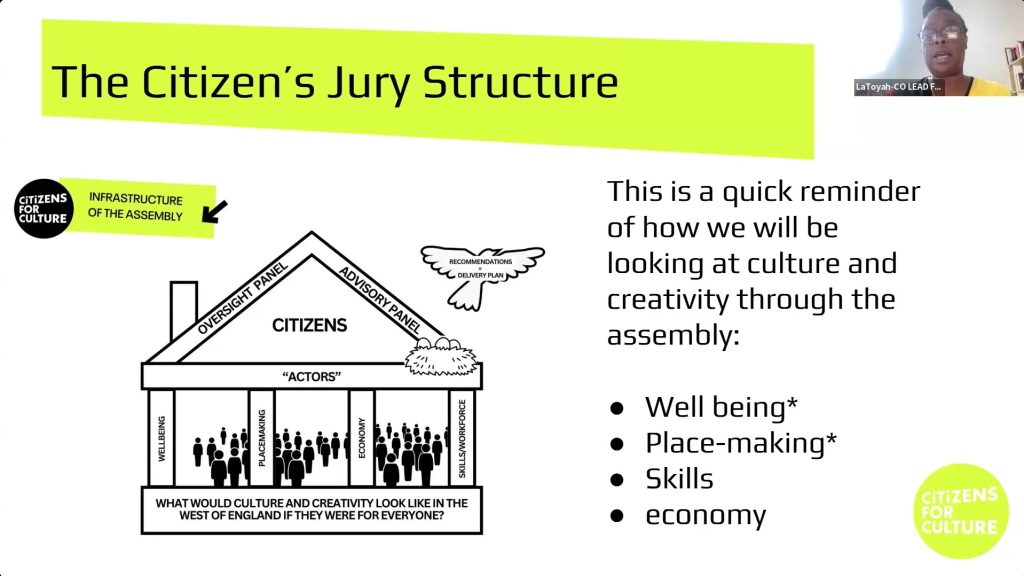
This weekend the West of England Citizens’ Assembly met for the second time, with sessions held online across the four Unitary Authorities.
On Saturday 27 September, citizens from Bristol and South Gloucestershire came together to deliberate, and on Sunday 28 September, citizens from Bath and North East Somerset and North Somerset met in their own online session.
The Citizens’ Assembly for the West of England is designed so that some meetings take place in person and some online.
In-person sessions give citizens the chance to connect as a whole group, while online meetings reduce travel and make it easier to take part regularly, as well as allowing more focused discussions on local issues.
The Cultural Plan and Assembly question
The central task for the Assembly is to create a Cultural Plan by answering the question:
What would culture and creativity look like in the West of England if they were for everyone?
The idea is that there are two layers to this plan. When the Assembly meets as a whole group, citizens consider the regional picture to shape a regional plan. When they meet in smaller area-based groups, like this weekend, they dig deeper into the issues and concerns which affect local areas.
This weekend focussed particularly on the themes of Wellbeing and Placemaking with presentations and discussions which explored these ideas in multiple ways.
Saturday and Sunday
Citizens began both days by introducing themselves in breakout groups and sharing what culture means to them personally, grounding the discussion in their own experiences. Assembly members have been going on cultural visits and having creative adventures across the region, as part of their Assembly experience.
Both days included a range of presentations and ideas. After each presentation, citizens worked in facilitated breakout groups to reflect, share observations, and prioritise questions for speakers. Groups were also encouraged to link their questions to both local and regional contexts, ensuring evidence could inform the Cultural Plans at both levels.
Citizens used simple tools, such as a “red card” to flag jargon or unclear points, to help keep discussions accessible to all. At the end of each round, groups fed one key observation back into the main room, so that a wide range of perspectives was captured.
Speakers for the weekend
Recordings of all the presentations and Q&As in the citizens’ assembly are made available so that citizens can revisit them as they reflect on the growing body of evidence.
Citizens themselves are also beginning to propose evidence and themes they would like to see presented to the Assembly.
In future sessions, alongside live presentations, citizens will also receive Snapshots. These are short summaries of research and sector-wide evidence prepared by a range of experts from the region and beyond. Snapshots cover topics ranging from creative education and inclusion, to everyday creativity and volunteering, to the state of museums and heritage. The intention is to give citizens access to as broad an evidence base as possible.
The next Assembly meetings will take place on Saturday 11 and Sunday 12 October when the themes will be Skills and Economy.
We will share the next update on Monday 13 October.
Privacy Policy | Cookie Policy | Terms and Conditions | Contact Us | Site infomation